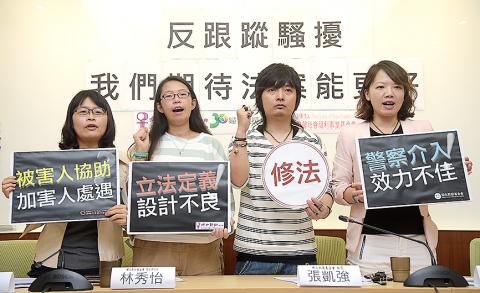The Executive Yuan needs to refine its draft anti-stalking act to broaden the range of pestering behavior covered and shorten the specified time frame for police investigations into complaints, women’s rights groups said yesterday.
While they support the idea of the bill, they said its current version would not provide enough protection to people who are being harassed or stalked.
Lawmakers on the legislature’s Internal Administration and Social Welfare and Environmental Hygiene committees yesterday questioned Ministry of the Interior officials over the draft approved by the Executive Yuan.

Photo: Huang Yao-cheng, Taipei Times
The draft defines “pestering behavior” as a person’s actions toward others, be it a specific individual or their families, spouses or those have close relations with them, out of “admiration, affection or resentment” cause the focus of the attention to feel disgusted or fearful.
The draft act lists seven types of pestering behavior: spying; stalking; repeatedly making telephone calls or sending messages to a person on a withheld number; persistently requesting dates; sending or exhibiting messages, images, sound, videos or other things to a person; menacing a person by showing things that could hurt their reputation; or using contact information to purchase unsolicited and unwanted items for a person.
If someone is being stalked by a stranger, they can hardly know and therefore prove the stalker’s motivation, Awakening Foundation director of development Lin Shiou-yi (林秀怡) told a news conference at the Legislative Yuan in Taipei.
Once a person files a complaint with police, the police are required to spend three months investigating the allegations, which is both time consuming and fails to provide a victim with timely protection, Taipei Women’s Rescue Foundation deputy chief executive Jasmine Bai (白智芳) said.
Police should finish a preliminary investigation into a complaint within 72 hours, and if the allegations are confirmed, they should issue a 10-day protection order that forbids a harasser from pestering the complainant during that time, she said.
However, Deputy Minister of the Interior Chiu Chang-yueh (邱昌嶽) told lawmakers during yesterday’s committee session that victims would not need to verify their harasser’s motivation before contacting police, because the police would start probing a case as soon as they received a victim’s complaint.
Police would first give a warning to the alleged harasser, and if the harasser is found to be pestering the complainant again within two years, police would ask the court for a protection order for the victim, he said.
Chinese Nationalist Party (KMT) Legislator Alicia Wang (王育敏) urged the ministry to allow police to issue a 10-day protection order to curb alleged harassers.
However, Chiu said that the suggestion could face legal issues and so it would need further consideration.

The manufacture of the remaining 28 M1A2T Abrams tanks Taiwan purchased from the US has recently been completed, and they are expected to be delivered within the next one to two months, a source said yesterday. The Ministry of National Defense is arranging cargo ships to transport the tanks to Taiwan as soon as possible, said the source, who is familiar with the matter. The estimated arrival time ranges from late this month to early next month, the source said. The 28 Abrams tanks make up the third and final batch of a total of 108 tanks, valued at about NT$40.5 billion

Travel agencies in Taiwan are working to secure alternative flights for travelers bound for New Zealand for the Lunar New Year holiday, as Air New Zealand workers are set to strike next week. The airline said that it has confirmed that the planned industrial action by its international wide-body cabin crew would go ahead on Thursday and Friday next week. While the Auckland-based carrier pledged to take reasonable measures to mitigate the impact of the workers’ strike, an Air New Zealand flight arriving at Taipei from Auckland on Thursday and another flight departing from Taipei for Auckland on Saturday would have to

A group from the Taiwanese Designers in Australia association yesterday represented Taiwan at the Midsumma Pride March in Melbourne. The march, held in the St. Kilda suburb, is the city’s largest LGBTQIA+ parade and the flagship event of the annual Midsumma Festival. It attracted more than 45,000 spectators who supported the 400 groups and 10,000 marchers that participated this year, the association said. Taiwanese Designers said they organized a team to march for Taiwan this year, joining politicians, government agencies, professionals and community organizations in showing support for LGBTQIA+ people and diverse communities. As the first country in Asia to legalize same-sex

MOTIVES QUESTIONED The PLA considers Xi’s policies toward Taiwan to be driven by personal considerations rather than military assessment, the Epoch Times reports Chinese President Xi Jinping’s (習近平) latest purge of the Chinese People’s Liberation Army (PLA) leadership might have been prompted by the military’s opposition to plans of invading Taiwan, the Epoch Times said. The Chinese military opposes waging war against Taiwan by a large consensus, putting it at odds with Xi’s vision, the Falun Gong-affiliated daily said in a report on Thursday, citing anonymous sources with insight into the PLA’s inner workings. The opposition is not the opinion of a few generals, but a widely shared view among the PLA cadre, the Epoch Times cited them as saying. “Chinese forces know full well that